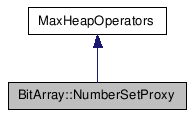#include <bitarray.h>
List
of all members.
Member Function Documentation
| operator bool |
( |
|
) |
const [inline] |
| bool operator! |
( |
|
) |
const [inline] |
| operator int |
( |
|
) |
const [inline] |
{
return mArray.NumberSetImpl();
}
| operator DWORD_PTR |
( |
|
) |
const [inline] |
{
return mArray.NumberSetImpl();
}
| operator float |
( |
|
) |
const [inline] |
{
return (float)mArray.NumberSetImpl();
}
| bool operator< |
( |
int |
n |
) |
const [inline] |
{
return (n <= 0) ? false : ((n == 1) ? mArray.IsEmpty() : !mArray.NumberSetAtLeastImpl(n));
}
| bool operator<= |
( |
int |
n |
) |
const [inline] |
{
return !mArray.NumberSetAtLeastImpl(n+1);
}
| bool operator> |
( |
int |
n |
) |
const [inline] |
{
return n ? mArray.NumberSetAtLeastImpl(n+1) : !mArray.IsEmpty();
}
| bool operator>= |
( |
int |
n |
) |
const [inline] |
{
return mArray.NumberSetAtLeastImpl(n);
}
| bool operator== |
( |
int |
n |
) |
const [inline] |
{
return mArray.NumberSetEqualImpl(n);
}
| bool operator!= |
( |
int |
n |
) |
const [inline] |
{
return !mArray.NumberSetEqualImpl(n);
}
| int operator+ |
( |
int |
n |
) |
const [inline] |
{
return mArray.NumberSetImpl() + n;
}
| int operator- |
( |
int |
n |
) |
const [inline] |
{
return mArray.NumberSetImpl() - n;
}
| int operator* |
( |
int |
n |
) |
const [inline] |
{
return mArray.NumberSetImpl() * n;
}
| int operator/ |
( |
int |
n |
) |
const [inline] |
{
return mArray.NumberSetImpl() / n;
}
| int operator% |
( |
int |
n |
) |
const [inline] |
{
return mArray.NumberSetImpl() % n;
}
{
return mArray.NumberSetImpl() + int(proxy);
}
{
return mArray.NumberSetImpl() - int(proxy);
}
{
return mArray.NumberSetImpl() * int(proxy);
}
Friends And Related Function Documentation
BitArray::NumberSetProxy
BitArray::NumberSetProxy BitArray::NumberSetProxy
BitArray::NumberSetProxy BitArray::NumberSetProxy
BitArray::NumberSetProxy BitArray::NumberSetProxy
BitArray::NumberSetProxy BitArray::NumberSetProxy
BitArray::NumberSetProxy
BitArray::NumberSetProxy
BitArray::NumberSetProxy BitArray::NumberSetProxy
BitArray::NumberSetProxy BitArray::NumberSetProxy
BitArray::NumberSetProxy BitArray::NumberSetProxy
BitArray::NumberSetProxy BitArray::NumberSetProxy
BitArray::NumberSetProxy

